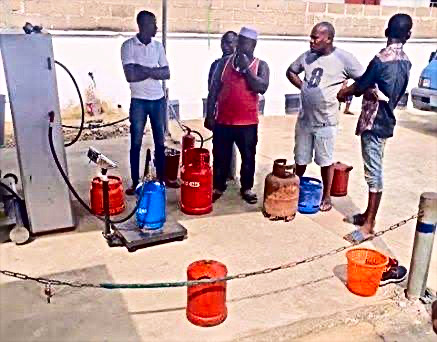KEY POINTS
- Average 5kg cooking gas refill fell 22% in August to ₦6,404, NBS data show.
- Larger 12.5kg cylinders dropped 21% to ₦16,195, with wide state-by-state price gaps.
- Decline coincides with Nigeria’s headline inflation easing to 20.12%, its fifth straight monthly drop.
Nigeria’s households caught a rare break in August as the average cost of refilling cooking gas cylinders plunged, offering relief to millions grappling with stubbornly high living expenses.
Data from the National Bureau of Statistics (NBS) show the average retail price for a 5-kilogram cylinder of Liquefied Petroleum Gas, or cooking gas, fell to ₦6,404.02 in August 2025, down 22% from July’s ₦8,243.79. The decline was even sharper for larger cylinders, with the average 12.5kg refill sliding to ₦16,195.07, a 21% monthly drop.
On a year-on-year basis, the picture is mixed. The 5kg refill price edged lower by just 0.40% compared with August 2024, while the 12.5kg price rose 4.1% over the same period.
Regional Gaps Remain
While the national average eased, prices varied widely across states. Katsina posted the highest average price for a 5kg refill at ₦6,945.21, closely followed by Taraba and Rivers. Delta State offered the cheapest refills at ₦5,657.50.
For 12.5kg cylinders, Yobe topped the list at ₦16,887.42, with Adamawa and Ebonyi just behind. Benue was the least expensive at ₦15,102.50, underscoring the persistent regional disparities in household energy costs.
The NBS analysis also shows that the North-West zone recorded the highest average cooking gas prices, while the South-South and South-West consistently trailed as the cheapest regions.
The easing in gas prices comes as Nigeria’s headline inflation rate slowed for the fifth straight month, dipping to 20.12% in August from 21.88% in July. Food inflation, long a source of strain for households, fell sharply to 21.87%, down from an eye-watering 37.5% a year earlier — though statisticians partly attribute the drop to a change in the base year.
Still, analysts say the pullback in cooking gas costs, combined with easing inflation, could bolster consumer confidence in the short term. For families struggling with rising fuel and transport costs, a cheaper kitchen flame offers some respite, even if the relief proves uneven and temporary.



